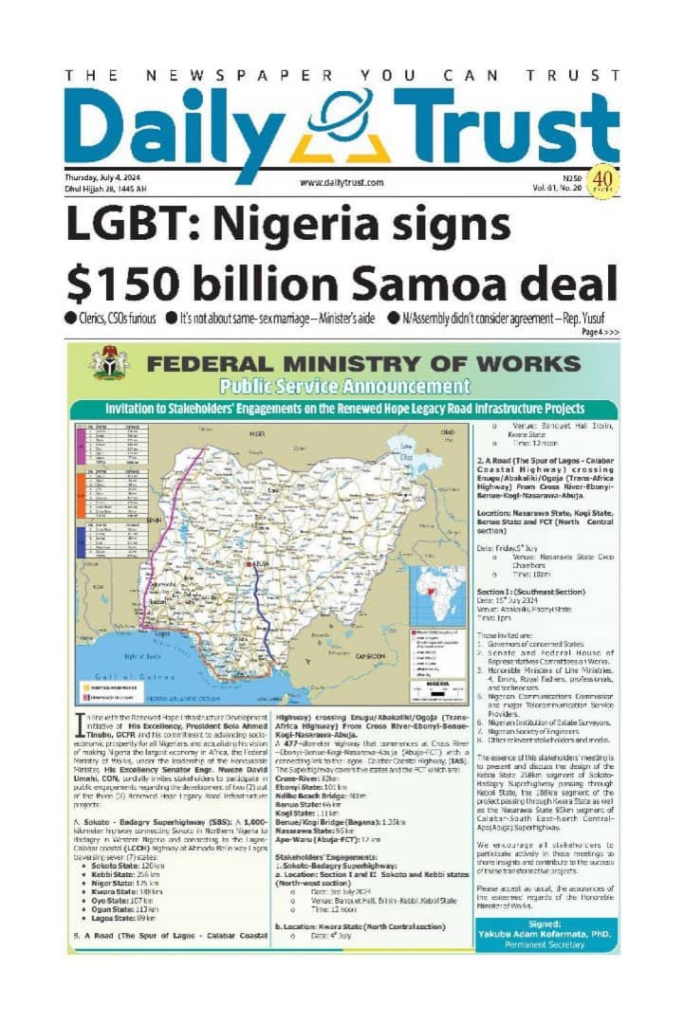Explainer: Did the Controversial $150 billion Samoa Deal Compel Nigeria To Legalise LGBTQ?

BY: Oluwaseye Ogunsanya
Social media has been awash with outrage over the federal government’s decision to sign the controversial $150 billion Samoa Deal.
This agreement which was named after Pacific Island Samoa where it was signed on November 15, 2023, surfaced in yesterday’s edition of Daily Trust Newspaper with the headline ‘LGBT: Nigeria Signs $150 Billion Samoa Deal’ and the news of Nigeria’s ratification of the agreement emerged on Monday, July 1, when Abubakar Atiku Bagudu, the minister of budget and economic planning, confirmed the development at a European Union (EU) reception in Abuja.

The agreement reportedly includes clauses that require underdeveloped and developing nations to support LGBTQ rights as a condition for receiving financial and other forms of support from advanced countries despite opposition from many countries that uphold Islamic and Christian values and are sensitive to their cultural norms.
What is the Samoa Deal About?
The Samoa deal is a partnership agreement between the European Union and its member states, of the one part and the members of the Organisation of African, Caribbean and Pacific States, of the other part.
According to the original document of the Samoa Agreement 2023 here which is made up of 103 Articles and Provisions, the European Union (EU) and the Organisation of the African, Caribbean and Pacific States (OACPS) agreed to a new partnership aimed at fostering mutually beneficial outcomes and shared values.
This agreement aligns with global frameworks, including the United Nations Sustainable Development Goals (SDGs), the 2030 Agenda for Sustainable Development, and the Paris Agreement on climate change and it seeks to address common interests and promote sustainable development across the involved regions.
Furthermore, the objectives of the agreement are to
- Promote, protect and fulfil human rights, democratic principles, the rule of law and good governance, paying particular attention to gender equality
- Build peaceful and resilient states and societies, tackling ongoing and emerging threats to peace and security; (c) (d) (e) (f)
- Foster human and social development, and in particular to eradicate poverty and address inequalities, ensuring that everyone enjoys a life of dignity and that no one is left behind, with special attention paid to women and girls
- Mobilise investment, support trade and foster private-sector development, with a view to achieving sustainable and inclusive growth and creating decent jobs for all
- Combat climate change, protect the environment and ensure the sustainable management of natural resources
- Implement a comprehensive and balanced approach to migration, so as to reap the benefits of safe, orderly and regular migration and mobility, stem irregular migration while addressing its root causes, in full respect of international law and in accordance with the Parties’ respective competences.
Why 35 OACPS Countries Refused to Sign the Agreement
During the formal signing ceremony held in Samoa, Ordo Iuris (Legal Order), a think tank located in Warsaw, Poland reported that as many as 35 OACPS countries refused to sign the agreement, which provisionally entered into force on 1 January 2024.
According to the report, among them were 20 African countries, nine Caribbean countries and six Pacific countries.
“Some of the African countries argued their opposition to the treaty’s provisions by raising the issue of non-discrimination, a provision they believe promotes the demands of the LGBT movement. These countries also point out that the treaty is underdeveloped.” It reads.
Recall that Nigeria also was initially absent at the signing of the Samoa Agreement, between the Member States of the Organisation of Africa, Caribbean and Pacific States (OACPS) and the European Union (EU) last November.
The reason for Nigeria’s absence then according to the Spokesperson of the Ministry of Foreign Affairs, Francisca Omayuli was that relevant Nigerian stakeholders were studying the instrument with a view to ensuring that its provisions do not contravene Nigeria’s domestic legislation.
“The general public is invited to note that Nigeria was not represented at the Signing Ceremony, which took place in Samoa on Wednesday, 15th November 2023 and hence has not signed the Agreement.
“Relevant Nigerian stakeholders are currently studying the Instrument with a view to ensuring that its provisions do not contravene Nigeria’s domestic legislation,” the statement had read.
Does the Agreement Compel Nigeria To Legalise LGBTQ?
A thorough search of the document using the keywords LGBTQ and Same Sex Marriage returned void meaning that there was no mention of such words in the agreement.
However, the 5th principle of Article 2 states that “the parties shall systemically promote a gender perspective and ensure that gender equality is mainstreamed across all policies” may have been misinterpreted to mean that signatories to the agreement are compelled to legalise same-sex marriage or LGBTQ.
Federal Government Reacts
In his reaction to the outrage that had greeted the news, the Minister of Information Mohammed Idris said in a statement on Thursday that Nigeria’s law on same-sex marriage supersedes the Samoa Agreement.
According to him, Nigeria signed the Agreement on Friday 28 June 2024 following extensive reviews and consultations by the Interministerial Committee, convened by the Federal Ministry of Budget and Economic Planning (FMBEP) in collaboration with the Ministry of Foreign Affairs (MFA) and Federal Ministry of Justice (FMOJ). He added that it was ensured that none of the 103 Articles and Provisions of the Agreement contravenes the 1999 Constitution as amended or the laws of Nigeria, and other extant Laws.
“In addition, Nigeria’s endorsement was accompanied by a Statement of Declaration, dated 26th June 2024, clarifying its understanding and context of the Agreement within its jurisdiction to the effect that any provision that is inconsistent with the laws of Nigeria shall be invalid. It is instructive to note that there is an existing legislation against same-sex relationships in Nigeria enacted in 2014.
“It is necessary to assure Nigerians that the President Bola Tinubu Administration, being a rule-based government, will not enter into any international agreement that will be detrimental to the interest of the country and its citizens. In negotiating the Agreement, our officials strictly followed the mandates exchanged in 2018 between the EU and the OACPS for the process.
“The Samoa Agreement is nothing but a vital legal framework for cooperation between the OACPS and the European Union, to promote sustainable development, fight climate change and its effects, generate investment opportunities, and foster collaboration among the OACPS Member States at the international stage.”
Similarly, the media assistant to the Minister of Budget and Economic Planning, Bolaji Adebiyi, also clarified on Wednesday that the documents referenced by Bagudu during the EU reception pertained strictly to economic development and did not mention LGBTQ or same-sex marriage.
Adebiyi insisted that Bagudu signed an agreement related to a $150 billion trade component, not LGBT issues.
Conclusion
Based on our findings, the Samoa Agreement does not in any way compel Nigeria to legalise LGBTQ as a condition for getting financial support. Similarly, the National Assembly have the power by law to consider, debate and adopt the international agreement before it can be domesticated in Nigeria however reports have it that the lawmakers have not gotten the agreement from the executive.
Also recall that former President Goodluck Jonathan in January 2014, signed into law a bill that criminalises same-sex relationships, defying Western pressure over gay rights and provoking United States criticism.
The law contains penalties of up to 14 years in prison and bans gay marriage, same-sex ‘amorous relationships’ and membership of gay rights groups.
Edited by Habeeb Adisa




